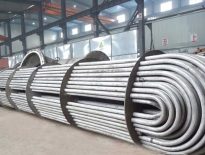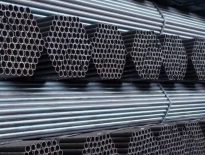Boiler tubes are pipes made from alloy steel, a material composed of carbon steel mixed with other elements like chromium, molybdenum, and nickel. The addition of these elements enhances the mechanical properties and resistance to heat and corrosion, making them ideal for use in high-temperature and high-pressure environments.
Boiler tubes, in general, are critical for transferring heat in systems such as boilers, heat exchangers, and furnaces. Alloy steel ensures these tubes operate efficiently and reliably in demanding conditions.
How Boiler Tubes Work
Boiler tubes work on a simple concept: they heat water to create steam, which is then used in many different kinds of industry. Designed to move hot gasses or steam, these tubes serve as heat transfer surfaces warming the water held inside their walls. The water running inside the tubes gets the heat energy from combustion gasses.
The functioning of a boiler’s tubes determines its safety and efficiency most importantly. Boiler tubes have to withstand high pressure, severe heat, corrosive surroundings, all the while guaranteeing ideal heat transfer.
Alloy Steel Boiler Tubes
Many components are alloyed to create Alloy Steel Boiler Tubes. It exhibits amazing mechanical properties. Alloy steel Boiler tubes are a standard version of Steel Boiler tubes comprising a variety of other important chemical elements. Some of the common alloys used to produce the Alloy Steel T5 Boiler Tubes are elements such as nickel, chromium, molybdenum, silicon, and boron. The Alloy Steel Boiler Tubes provide an outstanding quality, which includes excellent corrosion resistance, good strength, improved longevity, and fast weldability. Owing to its excellent power of resistance, various industries prefer to use Alloy steel type in manufacturing boilers.
There are two different types of Alloy Steel T9 Boiler Tubes available. These types are known as water-tube boilers and fire-tube boilers
Alloy Steel Water-tube boilers
A water-tube boiler with high pressure is a kind of boiler in which water circulates in tubes heated externally by the gas. Inside the furnace, fuel is burned, generating hot gas that heats water in the tubes to create steam. For smaller boilers, the furnace is isolated by external cooling tubing, whereas larger service boilers depend on the water-filled tubes that make up the furnace walls to produce steam.
Using hybrid water-tube / fire-tube systems was a marginally more effective adoption. Since the firebox is the hottest part of a locomotive boiler, use of a water-tube design and a conventional fire-tube boiler as an economizer in the usual position was a good solution here.
Alloy Steel Fire-tube Boilers
A fire-tube boiler is a type of boiler where hot gasses flow from a spark through one or more tubes flowing through a sealed container of water. Through thermal conduction, the heat of the gasses is transmitted through the tube walls, heating the air and eventually steam.
This style of the boiler was used in the horizontal locomotive configuration on nearly all steam locomotives. This has a cylindrical barrel that holds the fire tubes but also an expansion to accommodate the firebox at one end. This firebox has an open foundation to provide a large area of the grate and often stretches to create a rectangular or tapered structure beyond the cylindrical container.
Applications
Some of these Alloy Steel T11 Boiler Tubes find uses in unusual and extremely complex systems, for example in steam producing boilers, air pre-heater devices, and heat exchangers. Some steel alloy boiler tubes find important applications because of the ferromagnetic properties of iron where their reactions to magnetism are very significant, including in electric motors and transformers.
FAQ’s
Q1: What are the main benefits of alloy steel over carbon steel for boiler tubes?
A: Alloy steel provides superior heat resistance, corrosion resistance, and long-term durability compared to carbon steel, making it ideal for high-temperature and high-pressure boiler environments.
Q2: How do I determine the right alloy steel grade for my boiler application?
A: Selecting the correct grade depends on several factors, including the operating temperature, pressure, and exposure to corrosive substances. It’s best to consult with your supplier or an industry expert to choose the most suitable material.
Q3: What is the average service life of alloy steel boiler tubes?
A: When properly maintained, alloy steel boiler tubes can last anywhere from 15 to 30 years or more, depending on operational conditions and maintenance practices.
Q4: Can alloy steel boiler tubes be used in both fire-tube and water-tube boilers?
A: Yes, alloy steel boiler tubes are suitable for both fire-tube and water-tube boilers, especially in high-temperature and high-pressure applications where enhanced strength and corrosion resistance are required.
Q5: How often should alloy steel boiler tubes be inspected or maintained?
A: Regular inspections should be conducted at least annually, with more frequent checks in harsh operating environments. Preventive maintenance helps detect issues early and extends the life of the tubes.


